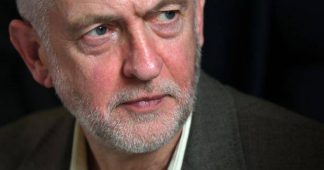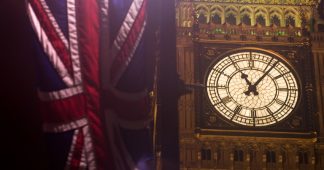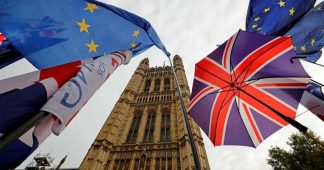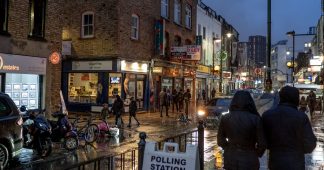21 January 2021
It is now a year since Britain left the EU, and less than a month since the terms of its separation were sealed, on Christmas Eve. What explains its departure from the Union half a century after joining it, and what light does this cast on the future of Europe itself? An answer to either of these questions requires a longer view than the vote on Brexit and the brief period since. In 1950, convinced of the superiority of its own economy and the strength of its ties with the US, the UK showed scant interest in the Schuman Plan, and little more in the preparations for the Treaty of Rome at Messina five years later. The future of the world, so it believed, lay in Anglo-American hegemony. It was not until after the shock of American desertion at Suez and the re-election in 1959 of a Conservative government under Harold Macmillan that this stance changed. By 1960, the poor performance of the British economy compared with those of the six countries that had created the European Economic Community (EEC) was plain and, strongly encouraged by the Kennedy administration in Washington, which saw Britain as a useful bridgehead into the Community, Macmillan applied for membership in 1962. Explaining that Britain would be little better than a Trojan horse for American domination of Europe, de Gaulle vetoed the application in January 1963.
The following year, Labour came to power in London. Before his death, Hugh Gaitskell had rallied the party to vigorous opposition to British entry into the EEC, arguing that it would mean the end of a thousand years as an independent nation. Harold Wilson could not make a speedy break with this position, but by 1967 British economic decline was so pronounced that he was able to renew an application for events with all-party support, in a motion carried in the Commons by 487 to 26 votes – a high-water mark of enthusiasm for Europe. No dice: six months later de Gaulle reissued his fin de non recevoir. It would take two events to alter the situation. In the summer of 1969, de Gaulle was succeeded by his prime minister, Georges Pompidou, who had played no role in the Resistance and made a postwar career in Rothschilds before rising through the ranks of the Gaullist administration. A year later, Edward Heath succeeded Wilson, heading a Conservative government in a time of decolonisation. Unlike any other British prime minister of the postwar epoch, Heath was overwhelmingly oriented to Europe, where he had fought during the Second World War, rather than to America. It did not, on the other hand, take him long to hit it off with Pompidou, who did not share Gaullist reservations about the US, to which he paid an official visit in 1970.
Pressing Britain’s application for entry to the Common Market as soon as he was in Downing Street, Heath took eighteen months to negotiate terms that were satisfactory to him and to Pompidou, a period probably extended by the need for Ireland and Denmark to do the same (Norway having opted out). The arithmetic in the Commons was not unfavourable. The Tories had 330 MPs to 288 Labour, six Liberals and six others. But although at least forty Conservative MPs were against joining the EEC, 69 Labour MPs led by Roy Jenkins were in favour. There was thus never any real risk of the government being defeated on the issue. When the decisive third reading of the European Communities Bill came in July 1972, it passed by 301 to 284 votes. Britain had finally made it into Europe. But there was a substantial catch. While still in opposition, Heath had promised that he would not take the country into the EEC without ‘the full-hearted consent’ of the Parliament and people of Britain. That was never tested. He flatly rejected any question of a referendum to ascertain the popular will, though there was little risk of him losing one. More important, the government systematically avoided the fact that its terms of entry instituted the supremacy of European law over British law – that they meant, in short, a derogation of national sovereignty. Not a single minister candidly admitted what the documents they were urging into law meant constitutionally. For Heath, Europe would be a substitute for empire, and that was sufficient; likewise his colleagues. As the journalist Hugo Young put it, ‘the deep, existential meaning, for Britain, of getting into “Europe” was not considered.’ No serious thought was given to the implications of accession. In his judgment, ‘ministers did not lie, but they avoided telling the full truth,’ leaving subsequent Conservatives to feel that ‘British entry was originally approved on false, even fraudulent pretences.’ To get the country into the Common Market, the government opted for obfuscation rather than openness.
From the opposition benches, Wilson had been obliged to denounce the treaty, while ensuring that Jenkins and others suffered no penalty for ensuring its passage. Restored to government in 1974, Labour went through the motions of renegotiating the terms Heath had secured from Pompidou, then staging a referendum on the revision. Wilson allowed his ministers to take whatever side they preferred in the ensuing campaign, in which Tony Benn from Labour and Enoch Powell from the opposition – he had by then left the Tories and joined the Ulster Unionists – campaigned for a No vote. In June 1975, on a turnout of 64 per cent, two-thirds of those who voted – 67 per cent – approved the deal Wilson had obtained. British membership of the Common Market looked rock solid. When Thatcher took over four years later, and promptly abolished exchange controls, releasing the City for further European deals, it strengthened again. By the mid-1980s, the British economy was outperforming its counterparts on the Continent, even as the long general downturn of the period cut growth rates across the world capitalist economy. In confident mood, Thatcher recovered two-thirds of the UK’s (disproportionately high) net contribution to the EEC budget, before helping to propel the next major stage of market integration – the Single European Act of 1987 under the president of the European Commission, Jacques Delors – from which she expected British financial services in particular to benefit.
It was not long before any such linear prospect was in trouble. At the Treasury, Nigel Lawson had pressed for British entry into the Community’s Exchange Rate Mechanism (ERM) in 1985, and when Thatcher vetoed this, shadowed it nonetheless. By 1989 the economy – pumped up by Lawson to secure Thatcher’s third electoral victory in 1987 – was visibly overheating, with a record balance of payments deficit, rising inflation and higher interest rates. For her part, Thatcher, sensing the direction in which Delors was heading with his committee on monetary union, dug in her heels over demands from her colleagues that she follow Brussels and Frankfurt, which were visibly gearing up for a single currency. By the end of 1989 Lawson was gone, and within a year Thatcher had followed him, toppled by her deputy, Geoffrey Howe, on account of her growing hostility to the Community. She was still strong enough to ensure that her favoured successor, John Major, took over, but it soon became clear that he had no more intention than Lawson or Howe of hewing to her vision of Europe. With scarcely over a year in office behind him, Major signed the Treaty of Maastricht, after negotiating an opt-out from the single currency. On his return to London, the government press release crowed that the upshot of the conference in the Netherlands was ‘game, set and match’ to Britain.
In the wake of this ostensible triumph, Major called an election in April 1992 and won it easily. Less than two months later, the Danes voted on the package their government had brought back from Maastricht, and rejected it. The Danish revolt sparked a British one, with dissident Tories and Liberal Democrats demanding a referendum on the treaty, the Telegraph, Sun and Spectator backing them, and polls showing public support for one. From the wings, Thatcher had become an increasingly vocal critic of Brussels. Just at this point, British membership of the ERM – which the country had entered in 1990 at too high an exchange rate – collapsed, destroying the credibility of the government. Limping through successive divisions over Maastricht without ever recovering politically, Major finally got ratification through in May 1993, a couple of days after the Danes were forced into holding a second referendum. At the Treasury, Kenneth Clarke presided over a return to growth, but it was of no electoral avail. The Conservatives were comprehensively thrashed in the elections of May 1997, leaving Tony Blair with the largest Commons majority of any government since 1945.
Dramatic though the overthrow of Major proved to be, it did not substantially alter the position of Britain in Europe. Once he was gone, however, the Euroscepticism he had just managed to keep in check broke loose, electing three Conservative leaders in succession – Hague, Duncan Smith and Howard – who were sworn opponents of Maastricht, none with any hope of winning an election. In government, Blair’s initial doubts about the single currency, prompted by the hostility to the euro of the Murdoch press that had helped elect him, soon faded. But Gordon Brown’s firm refusal to abandon sterling, made from his position of strength at the Exchequer, maintained the status quo bequeathed by Major. London would sign up to the Social Chapter that Major had sidestepped, but despite increasingly frantic pressure from Blair, the UK would respect the rest of the package negotiated at Maastricht, retaining its opt-out from the single currency. Brown was emboldened in this course by the continuing success, as it appeared, of Britain’s splendid isolation from the Eurozone. Here is Blair, addressing the Labour Party Conference at Brighton as prime minister in 1997:
We are one of the great innovative peoples. From the Magna Carta to the first Parliament to the industrial revolution to an empire that covered the world, most of the great inventions of modern times have Britain stamped on them: the telephone; the television; the computer; penicillin; the hovercraft; radar. Change is in the blood and bones of the British – we are by our nature and tradition innovators, adventurers, pioneers. As our great poet of renewal and recovery, John Milton, put it, we are ‘a nation not slow or dull, but of quick, ingenious and piercing spirit, acute to invent, subtle and sinewy to discourse, not beneath the reach of any point that human capacity can soar to’. Even today, we lead the world in design, pharmaceuticals, financial services, telecommunications. We have the world’s first language. Britain today is an exciting, inspiring place to be.
Captivated by the ‘rare brilliance’ of Blair’s speech to the National Assembly in Paris the following year, and the ‘effortless aplomb’ of his handling of questions about Europe, Young saluted his skill in leading the country out of the ‘darkness’ of the past, even if he was ‘not yet ready to name the day or the hour when the old world would end’. In the view of the real architect at Maastricht, the Dutch prime minister Ruud Lubbers, the pro-European British elite had been unable to represent the realities of integration to their compatriots. ‘It was if as the makers did not dare to tell the truth.’ Blair was braver, Young believed: it was plainly his intention to call a referendum on British entry into the Economic and Monetary Union (EMU) before it came into effect in January 2002. He was ‘unlikely to miss his opportunity to reposition the national mind’ on Europe: ‘now there was a prime minister prepared to align the island with the natural hinterland beyond.’
No such luck. Young, starstruck by Blair in 1997, was cruelly disappointed by the time of his death in autumn 2003, when the consequences not only of the war on Iraq, against which he had warned, but of the rift between Blair and Brown on Europe, were already plain.1 Blair lacked the courage to tackle the issue until he had won re-election in 2001, when he began pressing for entry to the EMU. Brown, however, master of the briefs the Treasury had produced for him, dug his heels in, and when the two clashed head-on in spring 2003 had no difficulty prevailing. Britain was star performer in the G8, with no reason to truckle to the wishes of others. In the autumn, Brown told the party that
While America and Japan have been in recession – while half of Europe is still in recession, Britain with a Labour government pursuing Labour policies has achieved economic growth in every year, indeed in every quarter of every year, for the whole six and a half years of this Labour government … Britain can be more than a bridge between Europe and America: our British values – what we say and do marrying enterprise and fairness, and about public services and the need to relieve poverty – can and should in time make Britain a model, a beacon for Europe, America and the rest of the world.
Brown’s relationship with Blair, as he would later report, never recovered from the rebuff he dealt his premier. So long as he stayed chancellor, his own political reputation remained intact. No sooner did he become prime minister in 2007, however, than the wheels fell off the triumphal chariot he thought he was riding. By the summer subprime mortgages in the US were in trouble, and were soon taking down with them the British banks that had plunged recklessly into the American housing market. By the autumn of 2008, the Royal Bank of Scotland – at the beginning of the year the flushest in the world, with nominal assets of £2.3 trillion, larger than Britain’s GDP – was effectively bankrupt, saved only by a last-minute government takeover. Amid the ruins of its braggadocio, New Labour was left with the worst fiscal deficit of the G7. Few were surprised when it was trounced at the polls in 2010.
Three years before the financial crisis, David Cameron had been elected to lead the Conservatives, promising to make them a more appealing alternative to Labour after the serial fiascos of his predecessors. Unlike them, he was not a Eurosceptic and made sure he got into office without damaging commitments of the kind that had helped sink them. But the party he led had shifted steadily further away from the positions of Heath and Howe. To the small group of bone-dry sceptics of 1972-75 were now added those who had broken with the party leadership over Maastricht, and yet more recently those who saw nothing positive in the arrangements of the Treaty of Lisbon, which succeeded it. All were on their guard against further concessions to Brussels, and in early 2011 forced the European Union Act through Parliament, making a referendum obligatory in the event that any further treaty revision was proposed. They were fortified in their position by the strength that Ukip had revealed in the European elections of 2009, when it came second with 16 per cent of the vote, behind the Tories with 27.4 per cent, but ahead of Labour with 15.2 per cent.
Helping Cameron, on the other hand, were the Liberal Democrats, who had taken nearly a quarter of the vote in 2010, and provided the coalition with enough seats for a comfortable majority of 76 in the Commons. Under Nick Clegg, who promptly scuttled his party’s pledge to scrap tuition fees for higher education, the Lib Dems were at one with the Tories in forcing harsh austerity on the country, but as a party remained unconditionally pro-European. The first test of the coalition’s mettle came when Angela Merkel decided, shortly before the 2010 British election, that it was essential the EU revise its treaties, adding a Fiscal Compact that would bind every government to rigid budgetary discipline, to check the danger of the Union unravelling amid tensions over the fallout of the Wall Street crisis. By November 2011, the regimes in Dublin, Lisbon, Athens, Rome and Madrid had all been toppled, helped along not infrequently by the demands of Berlin and Frankfurt. In December the European Council met in Brussels to vote on the German package to save the euro. Cameron vetoed its adoption, whereupon Merkel pushed it through as an inter-governmental treaty outside the framework of the Union. The compact was sealed early in 2012, making clear how ineffectual British opposition proved in practice to be.
Undaunted, Cameron called an election in May 2015. By now, Clegg’s role as a parliamentary footstool for the Tories had discredited the Lib Dems, and the party’s vote collapsed by nearly two-thirds, giving Cameron a small but workable Tory majority in the Commons. Buoyed by victory in the Scottish independence referendum a few months earlier, when warning of the economic dangers of a break with England had yielded comfortable support for the status quo, Cameron announced a referendum on membership of the EU the following spring, expecting that with leeway from the Union on migration, which had become a running source of complaint in domestic politics, he could carry the day without much difficulty. His insouciance was wrong. The footling concessions he secured in Europe won him no friends at home, and the timing and terms of the referendum were set, not by him nor his cabinet, but by the astute and clear-sighted strategists of the European Research Group (ERG) in the Commons, implacable adversaries of what the EU had become. Once the campaign began, two of his leading cabinet ministers – Michael Gove the slyest and Boris Johnson the most popular of his colleagues, neither of them close to the ERG, both actuated by career rather than conviction – declared themselves for Leave.
In parliamentary terms, Remain still had a winning hand, since Labour, the Lib Dems, the SNP, Plaid Cymru and the Greens were all theoretically with Cameron, who also retained the support of 53 per cent of the Tory delegation in the Commons, giving him the backing of 73 per cent of the House. Such proportions, however, were detached from the politics of the time. When Ed Miliband resigned as Labour leader after defeat in the 2015 general election, the first leadership poll in the party’s history to be decided on a simple one-person-one-vote basis, rather than by the block union and parliamentary quotas of the past, produced a landslide victory for Jeremy Corbyn, an outsider from the left. Corbyn soon made it clear he did not intend to repeat Miliband’s performance in the Scottish referendum – he had lined up with Cameron – but would argue for British retention of EU membership on his own terms, giving no support to the Tory government. Nor did the parliamentary statistics reflect the balance of opinion in the country, as would shortly become clear.
After a referendum campaign of ten weeks, 58 per cent of Tory, 37 per cent of Labour and 96 per cent of Ukip voters opted for Leave, yielding an overall majority of 52 per cent for Brexit, rising to 64 per cent in the poorest three categories of the population, C2DE. The only socioeconomic group where a majority voted to Remain was the most affluent stratum of the population, composed of members of categories A and B. All others preferred Leave. But if voters were divided not by income but by age and education, the result looked very different. Of those between 18 and 24 who voted, 73 per cent chose Remain; between 25 and 34, 62 per cent; between 35 and 44, 52 per cent; the majority of those over 44 voted for Leave. Similarly, 57 per cent of those with university degrees opted to Remain, 64 per cent with higher degrees, and 81 per cent in full-time education. Geographically, in England it was in university towns alone that Remain won handsomely.
Politically, the two camps were divided by contrasting perceptions of what was at stake in the referendum. The Remainers consisted essentially of two groups, those who were moved principally by cultural issues and those principally by economic issues. For the first group, composed of the young and most of the well-educated, the driving force was overwhelmingly a hostility to chauvinism – a rejection of the blind xenophobia and racism that threatened, they believed, to make Britain a suffocating prison of reaction. For the second group, leaving the EU threatened living standards, which were bound to drop cruelly on exit. Leavers were also divided into two groups. For the first, overwhelmingly located in the plebeian categories C2DE, the key issue was control over their own, and the country’s, destiny, something that could only be secured by departure from the EU. For the second, it was recovery of the independence that had been the basis of Britain’s prowess in the past. To these more general considerations, control of immigration and borders came second. Close to three-quarters of Remainers thought Britain a better country than thirty years earlier; nearly three-fifths of Leavers thought it worse.
Behind the clash of arguments and identities in June 2016 lay two critical legacies of New Labour. The first derived from Blair’s decision in 2004 to reward his Eastern European allies for their staunch role in the Iraq War. Poland, which had taken part in the US-UK led invasion and hosted a CIA torture chamber, received pride of place in the reception of immigrants to UK. Some 700,000 Poles eventually came, many more than Blair had bargained for. No other European country knew an influx of comparable size and speed so early on. By 2017, 400,000 Romanians and Bulgarians had joined them. The Cameron government, though acutely aware of the potential danger this cumulative influx represented to Tory stability, could do nothing to halt or mitigate it. When the referendum came, Ukip under Farage and Banks pulled no punches in the nativist operation it ran independently of Dominic Cummings’s Vote Leave, along a parallel track but at some distance from it.
The second legacy of New Labour, unlike the first, attracted virtually no public attention, but was probably more decisive. Had Blair pushed through accession to the EMU after 2001, or even after 2005, the outcome of the referendum would have been very different. It was his failure to override Brown, and lock Britain into the single currency when the economic going was still good for the country, that handed victory to Leave. For one lesson of the Monetary Union is crystal clear. Ceteris paribus, once a country is inside it, fear of the consequences of departure trumps all else if the issue is tested at the polls. The nearest a people came to leaving the single currency despite this was the Greek rejection of the Troika’s terms for a bailout in the referendum of 2015. That vote, however, was a simple negative: ‘Ochi’. The referendum lacked any positive proposal, and as soon as the Syriza government led by Alexis Tsipras capitulated, resistance to the worse terms he accepted dissolved virtually overnight. The reason was the one that had made Matteo Salvini of the Lega Nord in Italy and Marine Le Pen of the renamed Rassemblement National in France ultimately back away from any talk of exit from the EMU. Once the single currency was in force, people’s savings were held in euros. To leave the Monetary Union when this was an accomplished fact was to destroy their value. No party with a popular base dared risk such a prospect.
It was the complete absence of this danger which secured the victory of Leave in Britain. The masses who voted for Brexit believed they were striking a blow at Brussels and the neoliberalism under which they had suffered for a quarter of a century. In reality, that neoliberalism – harsher than anything on the Continent – was British in origin, and could be overthrown without any of the instant penalties that would have been incurred if the UK had been a loyal member of the EMU. As for those who voted against Brexit, their warnings of disaster were for all immediate purposes irrelevant. In the longer run, Claus Offe’s verdict – though imposition of the single currency was a huge mistake for Europe, unwinding it risks even greater harm to ordinary citizens – might hold good. But in 2016, such a risk was an abstraction. In their different ways, the two sides in the referendum battle shared the same illusion: in the world at large, defeat for their position would mean a loss of standing for Britain that was bound to be fatal to its prosperity. Neither of them paid the slightest attention to the obvious fact that (if we exclude toy-states like Liechtenstein, Monaco or Luxembourg) the two richest countries in Europe, with the most advanced welfare systems, do not belong to the EU: Switzerland and Norway. Both societies rejected integration with the Union in popular referendums and have flourished since doing so. In Britain, the cry from both camps says enough about their common motivation: what, be reduced to the rank of the Swiss or the Norwegians! Suppressed or blurted, nostalgia for Great Power status united the combatants in the referendum, compulsively grappling with each other in the dark.
Continue reading at www.lrb.co.uk











